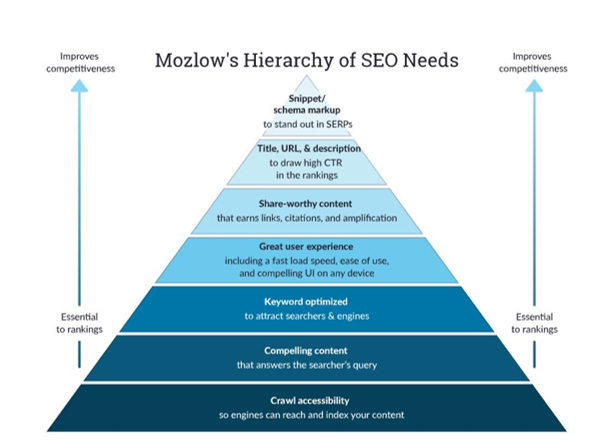It can be advantageous to keep track of and work with SEO on a website, even if our education is not focused on that topic. HubSpot offers a tool called SEO alerts, helpful in optimising a website - regardless of whether you have basic SEO knowledge or several years of experience.
All content on the website can be the key to visitors wanting to book a meeting with you if they see that the company is serious, credible and has knowledge in relevant topics. But to get visitors to the website, visibility on Google can be essential because if you are not visible, you do not exist.
What is SEO, and why is it important?
Ranking highest on Google is one of the most important ways to market yourself today. You do it via search engine advertising (SEA) or search engine optimisation (SEO).
The traffic generated from SEO is free, and in contrast to SEA, you don't pay per click. SEO is about refining the website's content, information architecture and credibility. If the content is relevant enough for the searchers, Google will rank the page high (gain more visibility) on the search results, leading to more visitors.
If you are interested in reading about the history of SEO, click here.
You can break down the value of SEO into three parts:
Organic search results
To rank high by organic search, you can't pay for your position on Google - you have to earn your ranking. The search engine ranks the pages based on the quality of the page's SEO, keywords, and those that attract the most visitors based on click-through rate (CTR).
Quality of organic traffic
The quality of organic traffic means getting the right target group of people to visit your website. It's not about getting as many visitors as possible but the right people interested in your products, information, or other resources you can offer on the site.
So here, you have to use the same keywords that your visitors use in your page title, meta description, or content to attract them.
Quantity of organic traffic
Many people who search on Google are more likely to click on the top result than looking for the right site, as they think the top is best. As a result, these companies get more organic traffic than quality organic traffic. Therefore, it is essential to have an SEO strategy to rank with relevant pages as high as possible.
What is keyword research, and why is it important?
The basis for SEO adapting a text or page is keyword research. You select these words based on, among other things, what terms people are searching for and how many people are searching for them.
You can use several programs to find these words, but you can also do it by typing in different searches of words and sentences on Google/Bing/Youtube to find keywords.
For example, you can:
- Brainstorm a list of relevant words
- Analyse the headlines and content on the pages that come up as you search for a keyword
- See suggestions in "Search related to" at the bottom of the page
- Look at "Google/Bing/Youtube suggest" to see what people are searching for often
- Use the Google Search Console
Keywords affect how you will write text, meta descriptions and titles. However, it's important to avoid keyword stuffing (overusing the keyword).
The building blocks of SEO
Image from moz.com
- Crawl accessibility – Google must first be able to read the content
- Compelling content – Interesting content
- Keyword optimised – Are the keywords interesting enough?
- Great user experience – how fast things load, easy to use the site, do people understand what to do?
- Share-worthy content - is the content unique and valuable?
- Title, URL and description – Are they good enough to attract readers?
- Snippet/schema markup – If the articles are described, it's easier for Google to understand what they're about
How HubSpot supports SEO
You know that HubSpot is more than a CRM system for you who have read our previous article about working in HubSpot. HubSpot can also help us SEO optimise the website via the tool SEO alerts, which means that we get notifications of what needs to be done on the website to reduce the number of alerts. So even if HubSpot tells you where you need to do changes, you still have to know about SEO to reduce the number of alerts.
Examples of SEO alerts we work with:
- Address pages with duplicate title tags - Some pages can get the exact address title, which Google may perceive as the same pages. Our task is to rename the pages to their correct title.
- Add image alt text attribute - Google wants all images on your pages to have explanatory text on what the image represents for people with visual impairment.
- Address pages with duplicate meta descriptions - The meta description can be double like the page title, so we must change the description and describe the correct content.
- Remove title from meta description - You should not have the page title in the meta description because it should explain what the page is about.
- Shorten meta description - It should be between 50 and 155 characters. So if it is too long, you can't see all text.
- Shorten title - Same here; if the page title is too long, your visitors can't read the full title.
If you're ready to start fixing your alerts, check out our video to see how we can assist you with boosting your search visibility and reaching your goals.
Four tips on how to SEO customise your content:
- First, write about things your customers, visitors, leads Etc., want to read about that are adapted to their needs, interests and your brand. It is easier to create content they want to search for and click on if you know your visitors. If the topics are relevant and many people search for them, Google thinks you are exciting and rank your pages higher.
- The general user experience is also essential in conjunction with content, not search engines. Google thinks that the user experience is significant to reach good placements on search engine results pages (SERP). Your website content should not deceive, making your website unique, valuable, or engaging. Make your website stand out from others in your field.
- Make sure that your meta description explains in a way so Google understands what your web page is about. This helps your page rank higher organically on Google.
- Some people search for images on Google. If your images have relevant file names and have well-describing alt texts, Google can match your images with keywords people use.
- The last tip is to have keywords in the content on the page. The keyword is the word or sentence people search for on Google search. So, if you know which terms your customers, leads, visitors, Etc., are using, you can create content from these words and align it with the right audience.
If you're planning to expand your SEO work, it might be time to look at how you can structure a dedicated SEO team. Find out more about how you can build an effective SEO team for your business.
We hope you find our content valuable, and we wish you a good week.
All the best,
Gina & Sofia



